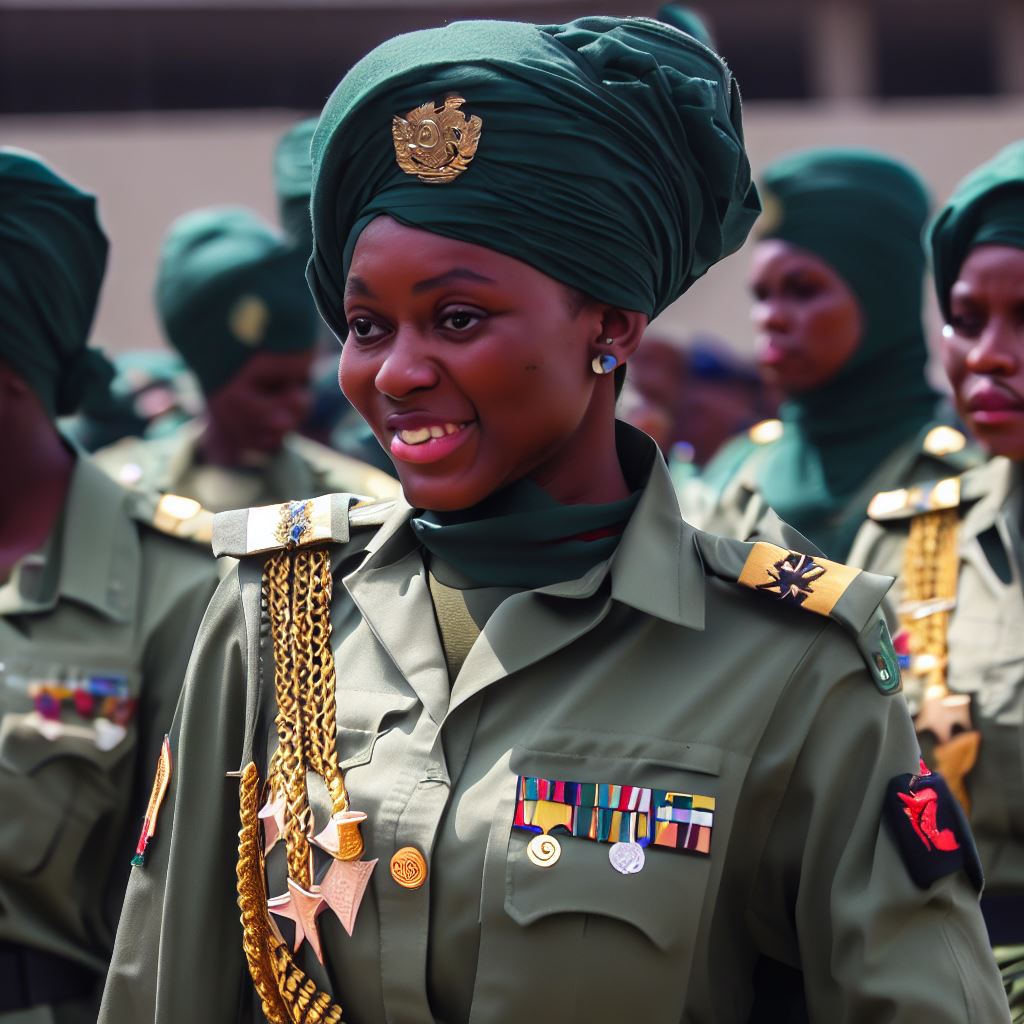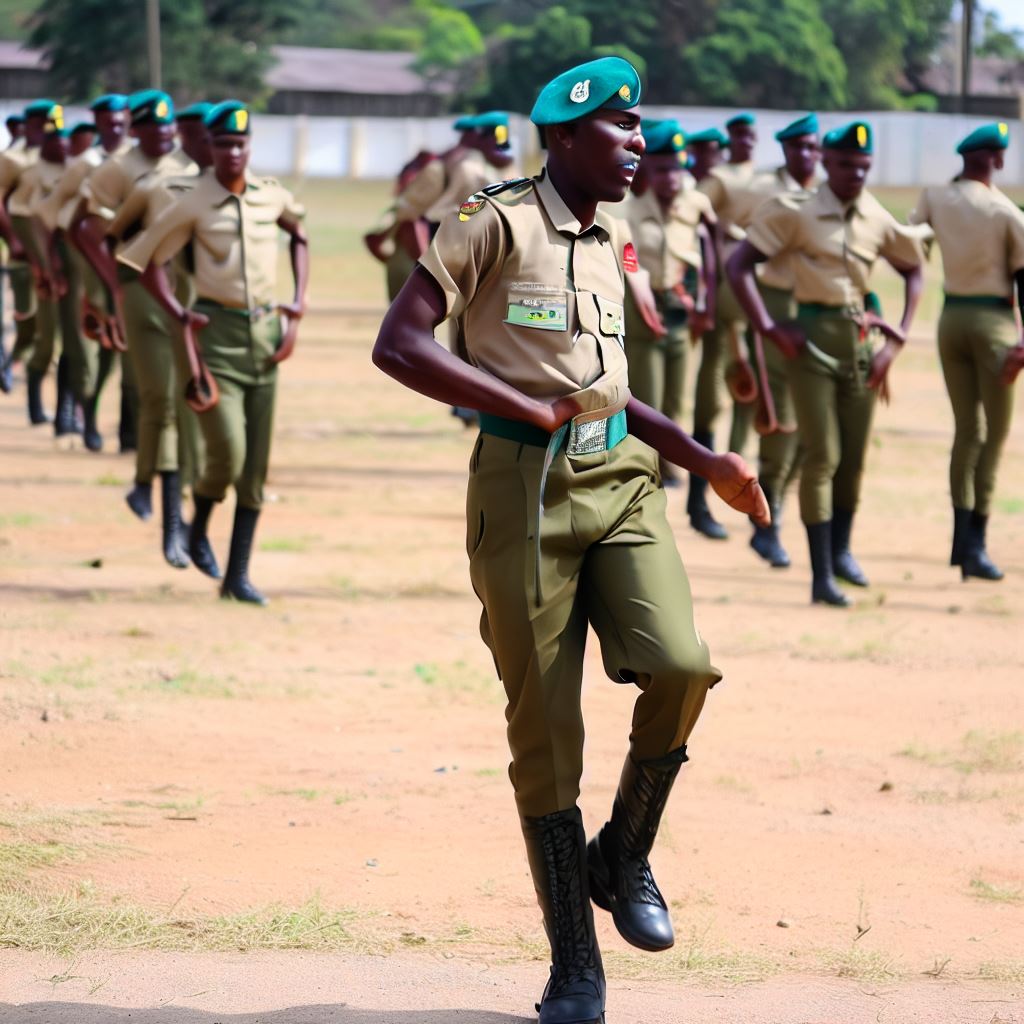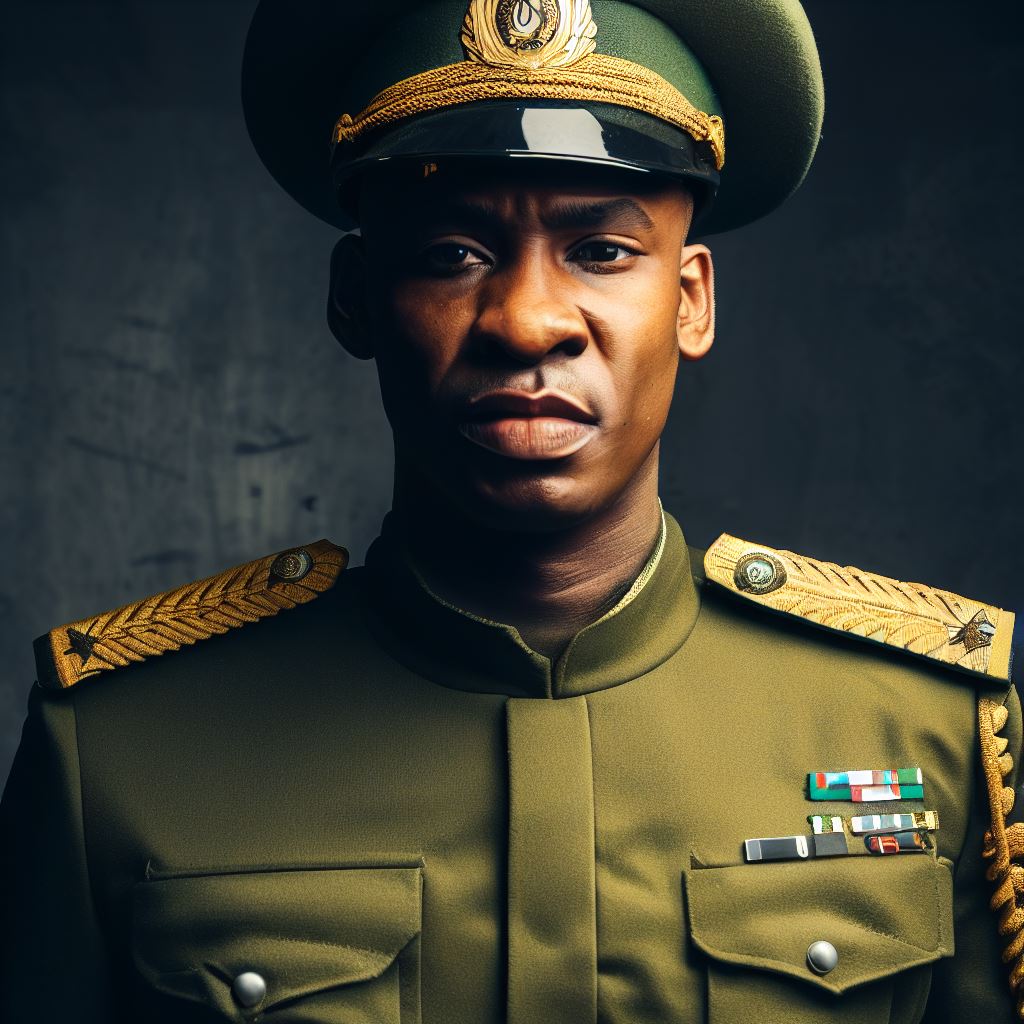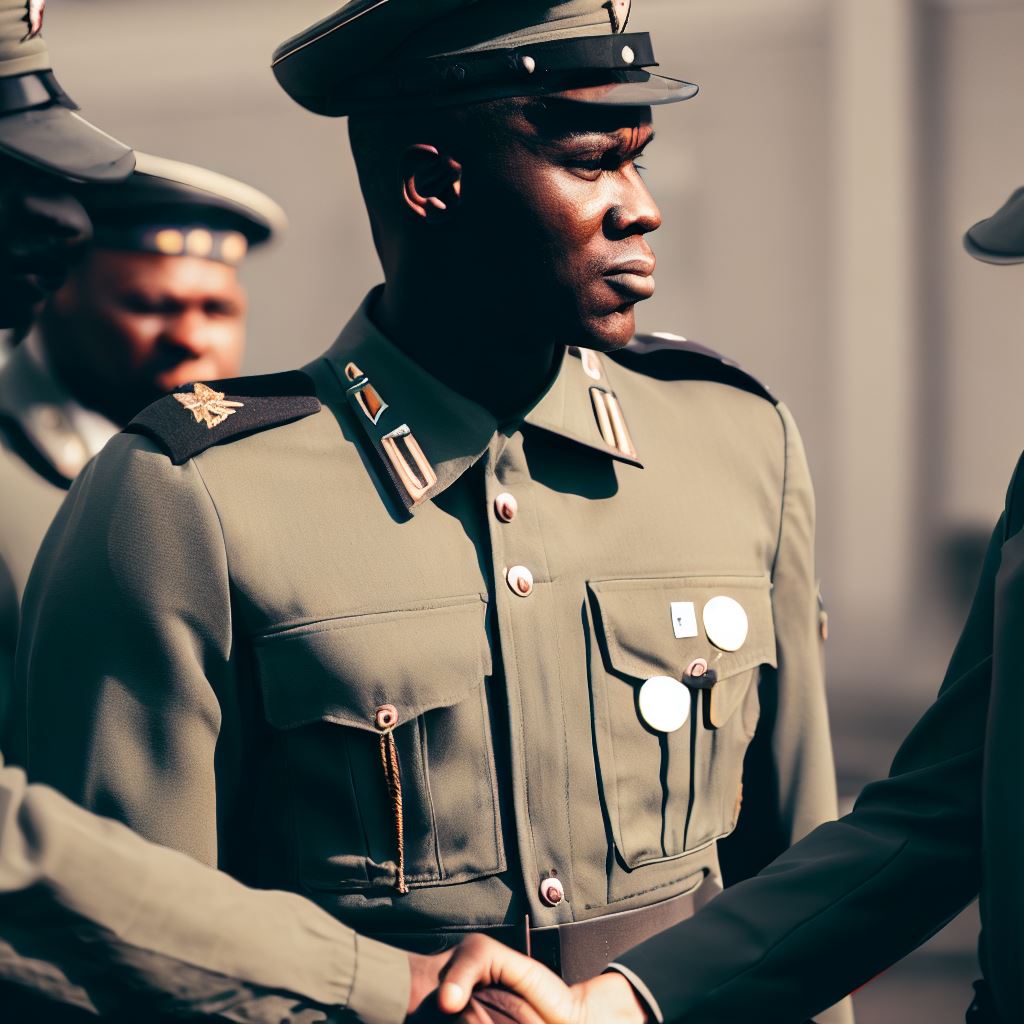Introduction
Paths to Becoming a Military Officer is a great adventure .The Nigerian military is an essential institution that ensures national security and protects its citizens. Military officers play a crucial role in maintaining peace and stability in Nigeria.
As the defenders of the nation, they face numerous challenges and responsibilities.
Whether it is combating terrorism, protecting borders, or responding to internal crises, military officers play a vital part in ensuring the safety and well-being of the Nigerian population.
Their presence is not only felt in times of conflict but also during peacekeeping missions and humanitarian efforts.
The Nigerian military officers are trained to exhibit exemplary leadership, discipline, and commitment to duty.
They are responsible for enforcing law and order, delivering justice, and upholding the country’s democratic values.
These officers undergo rigorous training and education to develop the necessary skills and knowledge required to perform their duties effectively.
Becoming a military officer in Nigeria is a highly esteemed career path that demands courage, dedication, and a strong sense of patriotism.
In this blog post, we will explore the various paths one can take to join the ranks of Nigeria’s esteemed military officers.
Requirements for Becoming a Military Officer in Nigeria
In order to become a military officer in Nigeria, there are several requirements that individuals must meet.
These include educational qualifications, age and physical fitness requirements, and considerations related to Nigerian citizenship and character.
Educational qualifications
One of the key requirements for becoming a military officer in Nigeria is to possess the necessary educational qualifications.
Aspiring candidates must have a minimum of a Bachelor’s degree from a recognized university or institution.
Furthermore, it is important for candidates to have a strong academic background, particularly in subjects such as mathematics, physics, and other science-related fields.
A solid educational foundation is considered crucial for success in military training and career progression.
Age and physical fitness requirements
Another critical factor in becoming a military officer in Nigeria is meeting the age and physical fitness requirements. Applicants must be between the ages of 18 and 25 years at the time of application.
Moreover, candidates must be physically fit and able to meet the rigorous demands of military training. This includes passing a physical fitness test that evaluates strength, endurance, and overall physical health.
Nigerian citizenship and character considerations
Being a citizen of Nigeria is a fundamental requirement for becoming a military officer. Applicants must provide proof of Nigerian citizenship and possess a valid national identity card or passport.
In addition to citizenship, character is also taken into consideration. Aspiring candidates must have good moral character and be of good reputation.
This is assessed through background checks, references from trustworthy individuals, and evidence of involvement in community service or leadership roles.
Furthermore, candidates must exhibit discipline, integrity, and a strong sense of loyalty to the Nigerian nation.
These character traits are seen as essential qualities for military officers who are entrusted with the responsibility of protecting the country.
Becoming a military officer in Nigeria requires meeting specific requirements.
These include educational qualifications, age and physical fitness requirements, and considerations related to Nigerian citizenship and character.
By meeting these requirements, aspiring candidates can pursue a fulfilling career in the Nigerian military and serve their country with honor and pride.
Read: Military Officer Ranks in Nigeria: A Comprehensive List
Nigerian Defence Academy (NDA)
The Nigerian Defence Academy (NDA) is the primary institution for training military officers in Nigeria.
It provides comprehensive training programs to groom individuals into capable leaders for the armed forces. Let’s take a closer look at the NDA and its various aspects:
Overview of the NDA
- The Nigerian Defence Academy (NDA) is a prestigious institution located in Kaduna, Nigeria.
- Established in 1964, the NDA plays a vital role in shaping the future of the Nigerian military.
- It is renowned for its excellent academic curriculum and rigorous training programs.
- The NDA aims to produce competent military officers who are well-equipped to handle national security challenges.
Admission Process and Entry Requirements
To become a military officer through the NDA, aspiring candidates must fulfill certain entry requirements and go through a competitive admission process. Here’s what you need to know:
- Applicants must be Nigerian citizens and have a minimum age of 17 years.
- They must also possess a minimum of five credits in relevant subjects in their Senior Secondary School Certificate Examination.
- Candidates need to undergo a medical examination to ensure they meet the physical and mental health standards required for military service.
- The admission process includes a written examination, physical fitness test, and an interview.
- Successful candidates are then admitted to the NDA for training.
Training Programs and Curriculum at the NDA
The Nigerian Defence Academy offers a comprehensive training program that prepares cadets for their future roles as military officers.
The curriculum covers a wide range of subjects and practical exercises. Let’s explore the key aspects:
- Academic Curriculum: Cadets undergo a four-year academic program at the NDA, covering disciplines such as military science, humanities, and social sciences.
- Military Training: The NDA focuses on developing leadership skills, physical fitness, and tactical knowledge through a rigorous military training program.
- Field Exercises: Cadets participate in numerous field exercises to apply their theoretical knowledge in practical scenarios.
- Specialized Training: The NDA provides specialized training based on the chosen branch of service, such as infantry, artillery, engineering, or air force.
- Character Development: Emphasis is placed on character development, instilling values like discipline, duty, loyalty, and honor in the cadets.
Overall, the Nigerian Defence Academy stands as a beacon of excellence in training military officers for the Nigerian armed forces.
The institution’s dedication to producing well-rounded leaders ensures the nation’s security and defense remains in capable hands.
Read: Benefits and Challenges: Military Service in Nigeria
Direct Short Service Commission (DSSC)
Direct Short Service Commission (DSSC) is a special training program in the Nigerian military that provides an opportunity for civilians to become military officers.
It is designed to address the need for specialized skills in the Nigerian Armed Forces.
To be eligible for the DSSC program, applicants must meet certain criteria.
They should be Nigerian citizens, between the ages of 20 and 30, and possess a minimum of a bachelor’s degree from a recognized institution.
Additionally, candidates must be physically and mentally fit, with no criminal record.
The selection process for DSSC is rigorous and competitive. It begins with the submission of application forms, followed by aptitude tests and medical examinations.
Successful candidates proceed to a screening exercise, which includes verification of credentials and interviews. Only the best candidates are selected for the training program.
Training for DSSC officers is conducted at the Nigerian Defence Academy (NDA) in Kaduna. The program duration is usually nine months, during which candidates undergo rigorous physical and academic training.
Upon completion of the DSSC program, officers are commissioned into different branches of the Nigerian military, such as the Nigerian Army, Nigerian Navy, and Nigerian Air Force.
DSSC offers several career opportunities for officers. They can progress through the ranks within the military, based on their performance and years of service.
As officers gain more experience, they may be eligible for specialized courses and further training to enhance their skills.
In addition to career advancement within the military, DSSC officers can also pursue postgraduate education or professional courses.
DSSC officers are afforded numerous benefits and privileges. These include competitive salaries, free medical care, accommodation, and pension plans.
The Direct Short Service Commission (DSSC) program is an excellent pathway for civilians seeking to become military officers in Nigeria.
Read: Military vs. Civilian Bomb Disposal in Nigeria
Regular Combatant Commission (RCC)
The Regular Combatant Commission (RCC) is a prestigious path to becoming a military officer in Nigeria. It offers exciting opportunities for individuals seeking a career in the armed forces.
Overview of RCC and its Significance
The RCC is a commission awarded to candidates who successfully complete the Nigerian Defence Academy (NDA) program.
It is the traditional route for individuals to gain entry into the Nigerian Army, Air Force, or Navy as regular officers.
Being part of the RCC signifies both honor and responsibility. These officers are expected to lead and command troops in combat, maintaining the integrity and security of the nation.
Entry Requirements and Selection Process
- Age: Applicants for RCC must be between 17 and 21 years old.
- Educational Qualifications: Candidates need minimum credits in five subjects, including Mathematics and English, in their O’Level examinations.
- Medical Fitness: Aspiring officers undergo thorough medical examinations to ensure they meet the required fitness standards.
- Selection Process: Candidates undergo a highly competitive selection process that includes a written examination, physical fitness tests, and an interview.
Training and Progression within the RCC
Once selected, candidates proceed to the Nigerian Defence Academy to undergo rigorous military training.
The training includes academic coursework, physical fitness training, weapons handling, field exercises, and leadership development.
Upon successful completion of the training program, candidates are commissioned as Second Lieutenants and deployed to their respective branches, where they undergo further specialized training.
Progression within the RCC is based on merit, competence, and professional development.
Officers can rise through various ranks, such as Lieutenant, Captain, Major, and beyond, depending on their performance and years of service.
Additionally, officers within the RCC can pursue further education and training opportunities, both within Nigeria and internationally, to enhance their skills and knowledge.
The Regular Combatant Commission (RCC) is a prestigious and highly competitive path towards becoming a military officer in Nigeria.
It offers individuals the opportunity to serve their country and contribute to national security.
The RCC’s rigorous selection process and comprehensive training ensure that only the most qualified candidates are commissioned.
Aspiring officers can expect a challenging but rewarding journey, with numerous opportunities for growth, career progression, and personal development.
Read: Nigerian Military Officer Duties: A Day in the Life
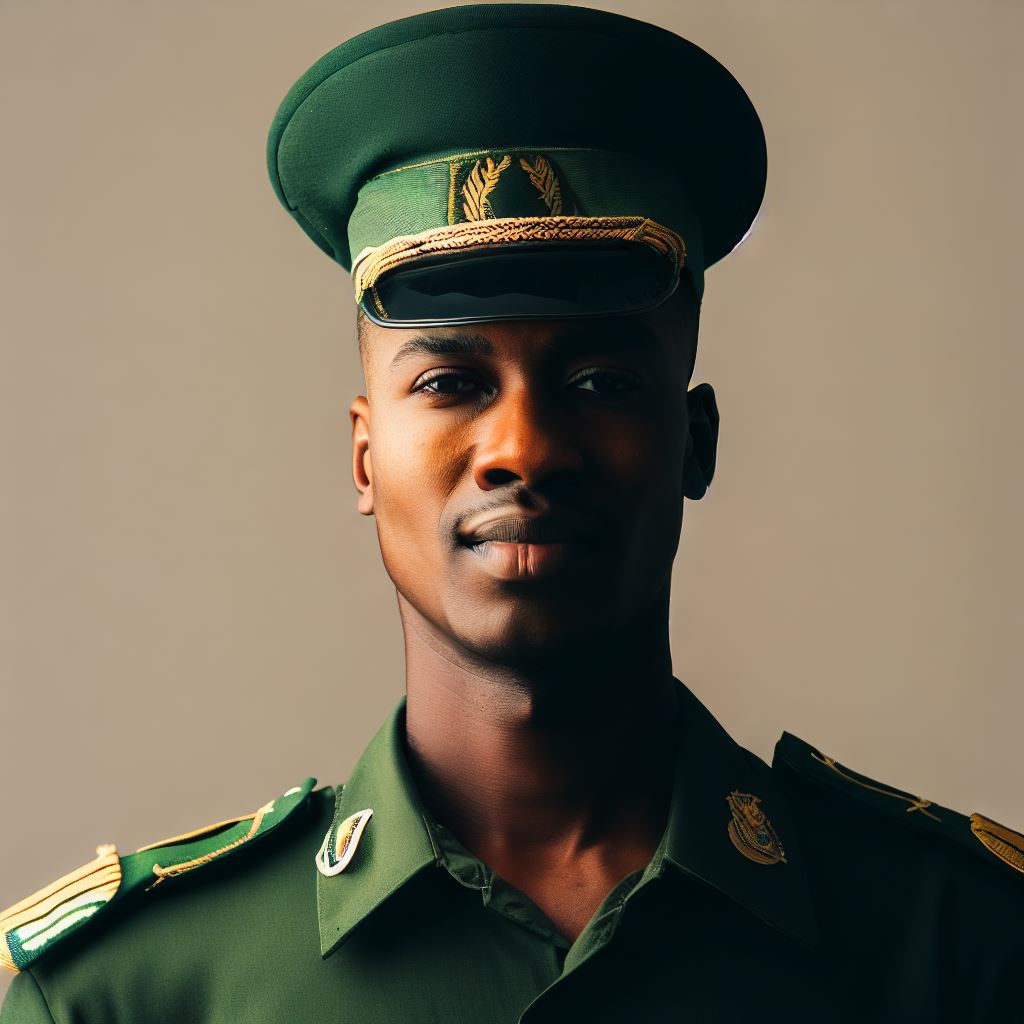
Role of Military Academies in Officer Training
Role of Nigerian Military School (NMS) and Nigerian Navy Secondary School (NNSS)
- Military academies like the Nigerian Military School (NMS) and Nigerian Navy Secondary School (NNSS) play a crucial role in grooming future military officers.
- These academies provide specialized education and training to candidates aspiring to become military officers in Nigeria.
- NMS, located in Zaria, focuses on training aspiring officers for the Nigerian Army, while NNSS, located in Lagos, trains future officers for the Nigerian Navy.
- Both academies have a rigorous curriculum that combines academic study, physical training, and discipline to shape candidates into capable leaders.
How these academies prepare candidates for military officer positions
- In military academies, candidates are exposed to a structured environment that simulates real-life military scenarios.
- They undergo intensive physical training to develop stamina, endurance, and discipline required for military life.
- Candidates also receive theoretical education to learn about military tactics, leadership principles, and strategic planning.
- Leadership development programs and hands-on experiences help candidates develop crucial skills like decision-making, teamwork, and resilience.
- Furthermore, military academies provide practical training in areas such as weapon handling, marksmanship, and combat techniques.
Advantages and disadvantages of attending military academies
Advantages
- Military academies offer a comprehensive and structured program, providing a solid foundation for a military career.
- They instill discipline, honor, and a strong work ethic in candidates, essential traits for military officers.
- Attending military academies enhances physical fitness, making candidates physically capable of handling demanding tasks.
- Academies provide opportunities for networking and building lifelong connections with fellow officers, creating a strong support system.
Disadvantages
- Military academies have strict rules and regulations, which may be challenging for some candidates to adapt to.
- The demanding nature of military training can put candidates under immense physical and mental stress.
- Academic requirements in military academies can be demanding, requiring a high level of commitment and dedication.
- The transition from military academy to active duty can be overwhelming for some graduates, as they face the reality of deployment and combat.
Military academies like the Nigerian Military School and Nigerian Navy Secondary School play a vital role in training candidates for military officer positions in Nigeria.
These academies provide a structured environment and comprehensive education that equips candidates with the necessary skills and knowledge.
While attending military academies has its advantages, it also presents challenges such as strict rules, physical and mental stress, and high academic expectations.
However, for those dedicated to serving in the military, these academies offer a solid pathway towards achieving their goal of becoming officers and leading with honor and integrity.
Experiences and Advice from Military Officers
Personal experiences and insights from current and retired military officers
- Real-life stories shared by military officers provide a valuable perspective on the path to becoming a military officer in Nigeria.
- These officers have firsthand experience of the challenges, sacrifices, and rewards of a career in the military.
- They share their journeys, from the decision to join the military to the rigorous training and deployments.
- Through their stories, aspiring officers can gain a deeper understanding of the realities they will face.
- Military officers recount how they overcame obstacles and developed leadership skills during their service.
Tips for aspiring officers on career preparation and success
- Military officers emphasize the importance of education and physical fitness in preparing for a career in the military.
- They advise aspiring officers to excel academically and participate in sports activities to develop discipline and teamwork.
- Understanding the Nigerian military’s core values, such as loyalty, bravery, and integrity, is crucial for success.|
- Building a network within the military community can provide valuable mentorship and career guidance.
- Additionally, aspiring officers are encouraged to undertake leadership roles in school or community organizations.
Guidance on dealing with challenges and obstacles in the military
- Military officers share strategies for navigating the challenges that come with a military career.
- They suggest maintaining a positive mindset, staying resilient, and embracing teamwork.
- Learning to adapt to different situations and being open to continuous learning is essential.
- Officers emphasize the importance of following orders while also thinking critically and making sound decisions.
- They advise aspiring officers to be prepared for sacrifices, including long deployments and time away from family.
The experiences and advice from military officers provide valuable insights and guidance for aspiring military officers in Nigeria.
Through personal stories, aspiring officers gain a realistic understanding of the challenges and rewards of a military career.
They also receive practical tips on preparing academically, physically, and emotionally for the demands of service.
The importance of developing leadership skills, building a network, and embracing core military values is also emphasized.
Lastly, officers offer guidance on overcoming challenges and maintaining resilience in the face of obstacles.
Armed with these experiences and advice, aspiring officers can better prepare themselves for the path to becoming a military officer in Nigeria.
Conclusion
There are several paths to becoming a military officer in Nigeria. One can join through the Nigerian Defence Academy or the Direct Short Service Commission.
Dedication, commitment, and patriotism are crucial in pursuing a military career.
To those considering a military officer career in Nigeria, I encourage you to stay focused and determined.
Remember, it is a noble profession that requires selflessness and a strong sense of duty to defend our country. Embrace the challenges and opportunities that come your way, and always strive for excellence.
By joining the military, you become part of a respected institution that plays a vital role in ensuring the security and sovereignty of Nigeria.
It is a chance to serve your nation and make a difference in the lives of your fellow citizens.
So, if you have the passion, the drive, and the love for your country, embark on this remarkable journey and become a military officer in Nigeria. The path awaits you, and the honor is waiting to be earned.

